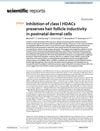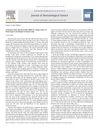 12 citations,
January 2014 in “Cell structure and function”
12 citations,
January 2014 in “Cell structure and function” Different combinations of human hair keratins affect how hair fibers form.
 11 citations,
July 2015 in “Gene”
11 citations,
July 2015 in “Gene” DHT affects bone growth by altering gene activity in osteoblasts, potentially complicating steroid use.
 11 citations,
January 2000 in “The Journal of Steroid Biochemistry and Molecular Biology”
11 citations,
January 2000 in “The Journal of Steroid Biochemistry and Molecular Biology” LY320236 is a strong blocker of two enzymes that change testosterone into dihydrotestosterone and might help treat conditions related to male hormones.
 9 citations,
January 2017 in “Annals of Dermatology”
9 citations,
January 2017 in “Annals of Dermatology” The study found genetic differences related to hair development that may explain hair loss in a patient with Trichorhinophalangeal syndrome type I.
 8 citations,
September 2016 in “Journal of Investigative Dermatology”
8 citations,
September 2016 in “Journal of Investigative Dermatology” Mice with more Flightless I protein grew back their claws better after amputation.
 6 citations,
December 2021 in “Scientific Reports”
6 citations,
December 2021 in “Scientific Reports” Inhibiting class I HDACs helps maintain hair growth ability in skin cells.
![Discovery of 7-Methoxy-6-[4-(4-Methyl-1,3-Thiazol-2-yl)-1H-Imidazol-5-yl]-1,3-Benzothiazole (TASP0382088): A Potent and Selective Transforming Growth Factor-β Type I Receptor Inhibitor as a Topical Drug for Alopecia](/images/research/9620bd26-3366-4f2a-bcac-f511697bbc41/small/35997.jpg) 6 citations,
January 2013 in “Chemical & pharmaceutical bulletin/Chemical and pharmaceutical bulletin”
6 citations,
January 2013 in “Chemical & pharmaceutical bulletin/Chemical and pharmaceutical bulletin” A new compound shows promise as a topical treatment for hair loss.
5 citations,
April 2017 in “The journal of investigative dermatology/Journal of investigative dermatology” The gene therapy showed significant wound healing and was safe for treating severe RDEB.
![Synthesis and In Vitro Study of 17β-[N-Ureylene-N,N′-Disubstituted]-4-Methyl-4-Aza-5α-Androstan-3-Ones as Selective Inhibitors of Type I 5α-Reductase](/images/research/d19df8a7-8de6-4430-8a0d-4ffa1f502985/small/15608.jpg) 5 citations,
February 1997 in “Bioorganic & Medicinal Chemistry”
5 citations,
February 1997 in “Bioorganic & Medicinal Chemistry” New compounds were made that effectively block a specific enzyme related to androgen conditions.
 4 citations,
September 2012 in “Journal of dermatological science”
4 citations,
September 2012 in “Journal of dermatological science” The hair follicle's connective tissue is a key source of a certain collagen in human scalp skin.
 4 citations,
April 2012 in “Asian-australasian Journal of Animal Sciences”
4 citations,
April 2012 in “Asian-australasian Journal of Animal Sciences” Red deer antler extract may help hair grow faster by increasing a growth protein.
 2 citations,
May 2011 in “Hair transplant forum international”
2 citations,
May 2011 in “Hair transplant forum international” The Intruder is a tool used for safely preparing the area where a donor's tissue is taken.
 2 citations,
September 2002 in “Journal of Endocrinological Investigation”
2 citations,
September 2002 in “Journal of Endocrinological Investigation” The GH-IGF-I axis is likely involved in the hormonal imbalances seen in non-obese women with functional hyperandrogenism.
1 citations,
April 2023 in “Scientific Reports” Self-assembling RADA16-I hydrogels with bioactive peptides significantly improve wound healing.
1 citations,
January 2021 in “Menoufia Medical Journal” Alopecia areata may be linked to heart issues.
 1 citations,
September 2016 in “Hair transplant forum international”
1 citations,
September 2016 in “Hair transplant forum international” Dr. Muhammad Ahmad created a simpler system to better describe male pattern hair loss.
 1 citations,
March 2014 in “Hair transplant forum international”
1 citations,
March 2014 in “Hair transplant forum international” Dr. Steve Gabel developed a method for consistent before and after photos in hair transplant surgery using specific camera settings and patient positioning.
 1 citations,
January 2014 in “Hair transplant forum international”
1 citations,
January 2014 in “Hair transplant forum international” The document thanks readers and asks for contributions to improve hair loss treatment standards.
1 citations,
January 2012 The CRABP I gene in cashmere goats is highly conserved but has unique features at specific amino sites.
 1 citations,
March 2011 in “Journal of Investigative Dermatology”
1 citations,
March 2011 in “Journal of Investigative Dermatology” Blocking RANK signaling might help treat metastatic melanoma, but more research is needed.
 1 citations,
May 2009 in “Hair transplant forum international”
1 citations,
May 2009 in “Hair transplant forum international” The document's conclusion cannot be provided as the document is not accessible or cannot be parsed.
 April 2024 in “Academic dermatology”
April 2024 in “Academic dermatology” Dermatologists should carefully manage hair loss in cancer patients to improve their quality of life.
March 2024 in “JACCP: journal of the American College of Clinical Pharmacy”  January 2023 in “Bioorganičeskaâ himiâ”
January 2023 in “Bioorganičeskaâ himiâ” The new compound is a promising, less toxic alternative to finasteride for treating prostate issues.

New peptide biomaterials based on RADA16-I hydrogel can improve wound healing and could be used for tissue engineering.
 March 2021 in “CRC Press eBooks”
March 2021 in “CRC Press eBooks” The document concludes that different patterns of hair thickness and scalp changes can help diagnose types of non-scarring hair loss.
 October 2020 in “Benha Journal of Applied Sciences”
October 2020 in “Benha Journal of Applied Sciences” Troponin I may help detect heart problems in people with Androgenetic Alopecia.
 June 2020 in “The journal of investigative dermatology/Journal of investigative dermatology”
June 2020 in “The journal of investigative dermatology/Journal of investigative dermatology” Pulsed red light boosts collagen and energy in cells faster than continuous red light.
 November 2015 in “Hair transplant forum international”
November 2015 in “Hair transplant forum international” Hair restoration surgery can cause muscle and joint problems due to poor workplace setup.
 September 2014 in “Hair transplant forum international”
September 2014 in “Hair transplant forum international” Galenic lotions can effectively treat different patterns of hair thinning in men and women.







![Discovery of 7-Methoxy-6-[4-(4-Methyl-1,3-Thiazol-2-yl)-1H-Imidazol-5-yl]-1,3-Benzothiazole (TASP0382088): A Potent and Selective Transforming Growth Factor-β Type I Receptor Inhibitor as a Topical Drug for Alopecia](/images/research/9620bd26-3366-4f2a-bcac-f511697bbc41/small/35997.jpg)
![Synthesis and In Vitro Study of 17β-[N-Ureylene-N,N′-Disubstituted]-4-Methyl-4-Aza-5α-Androstan-3-Ones as Selective Inhibitors of Type I 5α-Reductase](/images/research/d19df8a7-8de6-4430-8a0d-4ffa1f502985/small/15608.jpg)
















